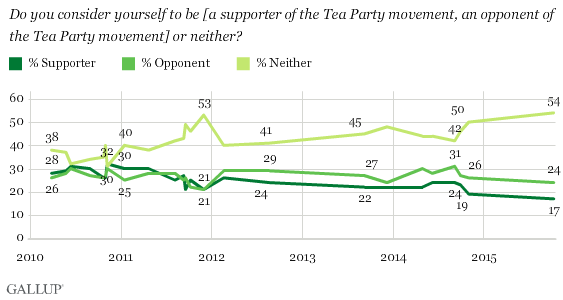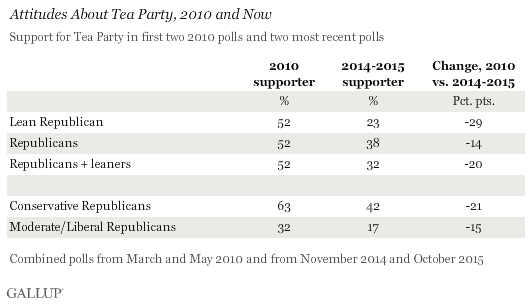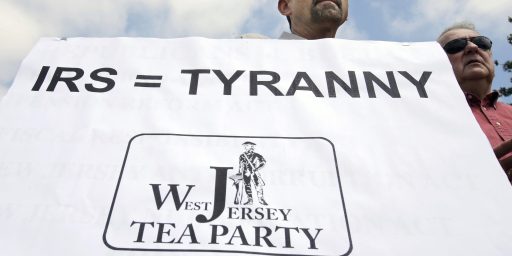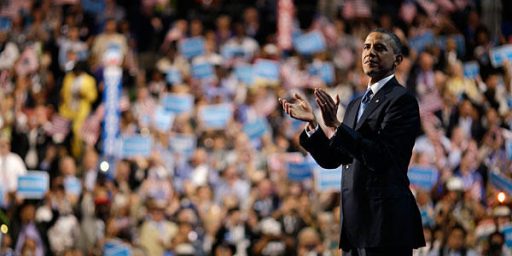Tea Party Support At All-Time Low, Even Among Republicans And Conservatives
A new poll shows that the Tea Party movement is more unpopular than it has ever been before, even among Republicans and conservatives.
A new poll indicates that support for the Tea Party has hit its lowest point since the movement came into existence:
WASHINGTON, D.C. — Americans’ support for the Tea Party has dropped to its lowest level since the movement emerged on the national political scene prior to the 2010 midterm elections. Seventeen percent of Americans now consider themselves Tea Party supporters, and a record 54% say they are neither supporters nor opponents.
The Tea Party emerged in 2009 in opposition to the fledgling Obama administration, and many Americans took sides for or against the movement in the midterm elections the next year. Support peaked at 32% in November 2010, just after those elections, in which Tea Party supporters were widely credited with helping the Republican Party gain control of the U.S. House of Representatives.
As support gradually eroded over the next year, opponents of the Tea Party gained the upper hand and have led supporters in all 10 Gallup polls measuring views of the movement since the start of 2012. Since August 2012, support has failed to reach 25%, and it has fallen below 20% in each of the last two polls.
Meanwhile, opposition peaked at 31% just ahead of last year’s midterm elections, but has dropped to 24% in the most recent Gallup poll, conducted Oct. 7-11.
As this chart shows, the largest group when it comes to attitudes about the Tea Party has been those who don’t consider themselves to be either supporters or opponents of the Tea Party movement, and that has hit an all-time high:
Looking beyond the national numbers, though, what’s particularly interesting is the fact that the movement’s reputation has declined significantly even among Republicans:
Almost two-thirds (63%) of conservative Republicans were supporters in the earliest polls. About four in 10 (42%) still support the Tea Party, but the 21-percentage-point drop since the 2010 polls is second only to the plunge in support from Republican leaners (independents who lean toward the GOP). A majority (52%) of GOP leaners, a key source for Republican votes, were supporters in the 2010 polls, but a 29-point drop has left only 23% still supporting the movement.
On the other side, liberal Democrats were the strongest opponents (61%) in the two 2010 polls, and their opposition was almost as high (59%) in the two most recent polls.
A few groups that were more likely to be supporters than opponents in 2010 have since switched sides, including those 65 and older, and those who are married.
While support for the Tea Party has not increased among any major subgroup since 2010, opposition to it has gone up among one — those with postgraduate education. In the earlier polls, 36% of this group opposed the Tea Party, and that number has grown to 53%. Meanwhile, opposition has dropped in a few groups — 18- to 29-year-olds, those with low incomes and unmarried females — because more in these groups no longer have an opinion about the Tea Party.
The numbers, and the change since 2010, can most easily be seen in this table:
Given the fact that the Republican Party’s political successes over the past five years, which include winning control of the House of Representatives in 2010 and the Senate in 2014, as well as successes in state legislative and Gubernatorial elections that are arguably having a greater impact than anything happening in Washington, these numbers might come as a surprise to the casual observer. After all, whatever one might think of the Tea Party it is seemingly undeniable that the movement did provide much of the enthusiasm and, most importantly, organizational support that led to the Republican victories that we have seen over the past five years. Without question, there are several Senators and Members of Congress, along with many state legislators who owe their victories in no small part to the volunteers that the Tea Party movement and its various organizations. Additionally, as far as the Republican base goes, there movement represents many of the things that conservatives have been arguing in favor of for quite some time now. That, combined with the old adage that ‘nothing succeeds like success’ would lead one to think that the Tea Party would become more popular inside the Republican Party and among conservatives as Republicans have succeeded electorally, but instead the opposite seems to have happened. When you look beyond the mere matter of electoral success, though, it’s somewhat easier to understand why Republicans and conservatives have turned against the movement that put them in power.
From the beginning, Republicans found that while the Tea Party was a fabulous force to help them bounce back from the back-to-back defeats suffered in the 2006 mid-term and 2008 Presidential elections, it was also a force that had great potential to damage the party far more than it helped it. We saw the first examples of this in the 2010 elections when, thanks to Tea Party support, the Republican Party ended up putting up candidates for Senate such as Sharron Angle in Nevada, Joe Miller in Alaska, and Christine O’Donnell in Delaware. Each of these were states that GOP arguably had a good chance of winning in what turned out to be a very good year for Republicans, but in two of those cases the fact that Tea Party forces were able to use their numbers in a primary to force the nomination of the weakest possible candidates, Angle and O’Donnell, meant that the GOP lost seats that they arguably should have won. The GOP was spared a similar fate in Alaska only because Senator Lisa Murkowski decided to try something that had only succeeded once before in American politics, win a Senate seat via a write-in vote. The Angle and O’Donnell races, though, stood out as particularly good examples of the negative impact the Tea Party could have on the party. We saw much the same impact in 2012, with Tea Party forces once again putting forward candidates that made seemingly winnable races much more difficult, especially in a Presidential election year.
Beyond election results and candidate selection, though, the real impact of the Tea Party on Republican fortunes could be seen in the impact that the movement had on how Republicans were able to act even as they regained control of Congress in 2010. Virtually from the moment that the newly elected Republican House took office in 2011, you could see the signs that the pressures from Tea Party activists were going to force the party to become more radical and intransigent that many of those in leadership would probably have preferred. To some degree, this was the fault of the leadership itself because the decision to eliminate earmarking and other measures greatly reduced the leverage that party leaders had over caucus members at the same time that changes in fundraising practices made outside groups much more influential than official party organizations such as the Republican National Committee and the National Republican Congressional Committee. As a result, the return of Republican rule to Capitol Hill saw the House engaging in countless fruitless attempts to repeal the Affordable Care Act, showdowns with Congressional Democrats and the White House over budget issues that became much harder to resolve due to the leadership’s lack of influence over caucus members, and, most famously, the 2013 shutdown crisis which resulted in a sixteen-day shutdown that had an adverse impact on the GOP’s approval numbers.
In the wake of the 2013 shutdown, the more establishment wing of the GOP vowed to not let the Tea Party roll over the primary process the way that it had in the previous two election cycles. The result were a number of hard-fought battles between incumbents or establishment-backed candidates in primaries in states across the nation. Perhaps the most widely covered of these were the Republican Senate Primary in Mississippi, in which Senator Thad Cochran managed to fend off a Tea Party backed challenge from State Senator Chris McDaniel, and Kentucky, where Mitch McConnell easily disposed of a challenge from Tea Party backed Matt Bevin. The 2014 cycle also saw similar battles in Texas, South Carolina, North Carolina, Mississippi. Kansas, Tennessee, and Alaska. To the extent that the Tea Party succeeded in 2014, it was at the House level, where we’ve seen Tea Party back candidates defeated both former House Majority Leader Eric Cantor and Congressman Ralph Hall. By and large, then, the establishment wing of the GOP won the battle in 2014, but as we have seen in the downfall of John Boehner and Kevin McCarthy and the resistance to Paul Ryan becoming Speaker, they have not necessarily won the war. Indeed, while the Tea Party lost badly in 2014, it clearly hasn’t gone anywhere and those involved in it continue to try to cause mischief.
Far from being allies, then, the Republican Party and the Tea Party movement, which to a large degree has come to be dominated by groups more concerned about fundraising than actually accomplishing anything, has become more and more adversarial as time has gone on. Given that, it’s perhaps not hard to see why even among Republicans the reputation of the movement has declined so significantly. The question, of course, is what impact this might have on the future of the GOP and American politics in general. To some degree, the impact may be less than one might expect simply because the differences between the Tea Party and the GOP at this point are more over tactics and strategy than they are over policies. When it comes to ideology, the Tea Party has won the war by moving the GOP further to the right than it has been in a long time, if ever, and that’s not likely to change any time in the future. The question Republicans will have to ask themselves going forward is whether they’ll be willing to make the compromises necessary to actually accomplish things, or whether they will continue tilting at ideological windmills. With Paul Ryan set to take the Speaker’s gavel this week, we’re likely to get a good idea of how that battle will work out over the coming months.









I absolutely love that table that shows declining Republican support for the Tea Party. It is especially amazing in light of the fact that Republicans now control Congress, and the Tea Party leadership wing – the “Freedom” Caucus – is now is calling the shots for Republican leadership.This is EXACTLY what Republican voters wanted, and they got it.
That is a lot of people who are closet supporters of the Tea Party – they just don’t want to openly be affiliated with the negatives that go along with a group of people who are willing to leverage a federal default against their budget demands. These 54% are basically lying to pollsters.
The Republicans are playing with fire. Much of the Republican base is composed of older white people. If they don’t increase the debt ceiling and these older white people don’t get their Social Security they are not going to be pleased and it will hurt them in 2016. In addition the stock market will crash and the investor class will not be happy. Expect to see the PAC money dry up for the tea party candidates and the “freedom caucus” in the House could be considerably smaller after 2016. There is already talk in Texas which is still red but trending purple Ted Cruz will not be able to retain his Senate seat. Texans don’t think that Cruz has done anything to help the state and in fact has proven to be an embarrassment.
Now trending: apathy.
Except that’s not at all what this chart shows. Seriously, look at the chart. Opposition to the Tea Party is dead flat, varying within narrow bounds. No statistically significant trend. At the same time, the number of Tea Party supporters per opponent has trended steadily downward, and is now at an all-time low of about 0.7.
“Neither” is not an attitude or a position — it’s the absence of an attitude. What has grown is disillusionment among former Tea Party supporters; nothing else has changed.
Especially since it looks like a lot of the Tea Party groups are the equivalent of marketing scams running around asking for money to spend, most of which goes to themselves.
I’m not unhappy about this at all. The more money the grifters pull from the rubes to line their own pockets, the less will be paid on actual action.
At an all-time low and yet….
…the crazies remain and have moved on to the next shiny thing.
The Tea Party Movement should really be called the White Backlash Movement-because that is what it is. It is a movement organized around one central idea-opposition to anything and everything the black man in the White House stands for. Needless to say, this is not a coherent ideology, but it provided enormous energy to the Republican Party that fostered and funded this movement. The drawback its that unfortunately it has led the Republican Party to a dead end. They have had enormous electoral success-but they have not achieved their objective of unseating and stopping Obama, nor of returning the United States to some never-never land of 1950s America, where minorities knew their place, women knew who was boss, and all was right with the world.
Virtually everything the Republicans promised their Tea Party followers has not worked out as planned-the economy has mostly recovered, Obamacare exists and is working, and most infuriatingly of all, Obama is still in the White House,doing things like (partially) implementing immigration reform on his own. Finally, it’s also beginning to look like the Presidency is also out of the reach and is going to end up in the hands of HRC, who as Rush Limbaugh listeners know, is a murdering feminazi who should be in jail and who is going to continue the Kenyan’s program of turning the USA into a socialist h#llhole.
Just about the only thing is Tea Party led Republican Party knows how to do is to shut down the government, deny Obama judicial appointments, and hold futile anti Obamacare votes. This is much less than was promised. Not surprisingly , disillusionment has set in. It looks like the Republican Party will be going into 2016 minus a good ideal of the energy it has had at its back since 2009. That’s good news for liberals.
The Republican Party is probably not going to rid itself of its destructive Tea Party symbiote absent a sweeping defeat at the polls. The way things are shaping up, that might just happen next year.Let’s hope it does, for the good of the country and for the Republican Party, which needs to get the Tea Party off its back and become a sane party once more.
The name “Tea Party” may be unpopular…but the same insane people are still out there.
Who do you think is supporting Trump and Carson and believing all the crap they say?
The Tea Baggers were never the sharpest knives in the drawer…and Trump is the perfect symbol of the idiocy that the Baggers are still bringing to the Republican Party. Sarah Palin with a comb-over.
Call them whatever you want…the Republican Party is still full of insane lunatics who have no idea what they are talking about.
@stonetools:
This is where I have trouble with this. Somewhere between TR and the Great Depression, the Rs became the party of wealth. As such they opposed any effective measures for recovery from the depression, fought SS, opposed taxes on the wealthy, and were isolationist as the world fell into fascism and WWII. Now they are mindlessly interventionist instead of mindlessly isolationist, but they still want to destroy SS, Medicare, and Obamacare, they still oppose taxing the wealthy, fight any measure to recover from the Great Depression (except bailing out their banks), and have added environmental irresponsibility to their agenda.
They may have been less crazy once upon a time, but I’m not sure there has been a time in the last century that they were sane. And I’m not sure I don’t prefer having them obviously nuts.
I see that Kansas tea party governor has an 18% approval rating as even the people of that very red state realize he has ruined the state.
Successes? They won some offices, but what “successes” are we talking about? The Kansas Miracle?
I think part of the problem is that the Tea Party movement is that they’re a success in the same way that Brandon Weeden or Matt Cassel is a success.
Yes, you’re on the field wearing the uniform….but success will be measured in other, more meaningful ways.
Republicans seem ready to do this. The Tea Party….not so much.
Unfortunately the tea party can still do a tremendous amount of damage to the country. If the debt ceiling isn’t raised we could see horrific job and stock market losses.
Now if the impact could be restricted to red states that’d be A-OK with me then. They voted these crazies in, let them deal with the fallout.
I wish Obama could meet with them and give them some kind of “Federalism Lite”. Medicare cuts, S.S. cuts, name it, give them what they want BUT only apply their program in their states.
Of course they’d be tarred and feathered in minutes if this was ever implemented. There is an utter disconnect with the voters on S.S. and Medicare who want to get rid of “Big Government”.
The tea party crowd that wants the Government out of their Medicare is going to be tough to wake to reality.
@James Pearce:
No no no, you don’t understand. It’s not about legislating and governing and actually accomplishing things; it’s about winning elections and holding seats. That’s how we keep score; everything else is subjective and requires thought, and so is probably socialist if not outright communist.
Sheesh, you probably think stock prices are supposed to have something to do with company performance, too…
@DrDaveT:
I am more that happy to have them think this. Now for a demonstration of real power….